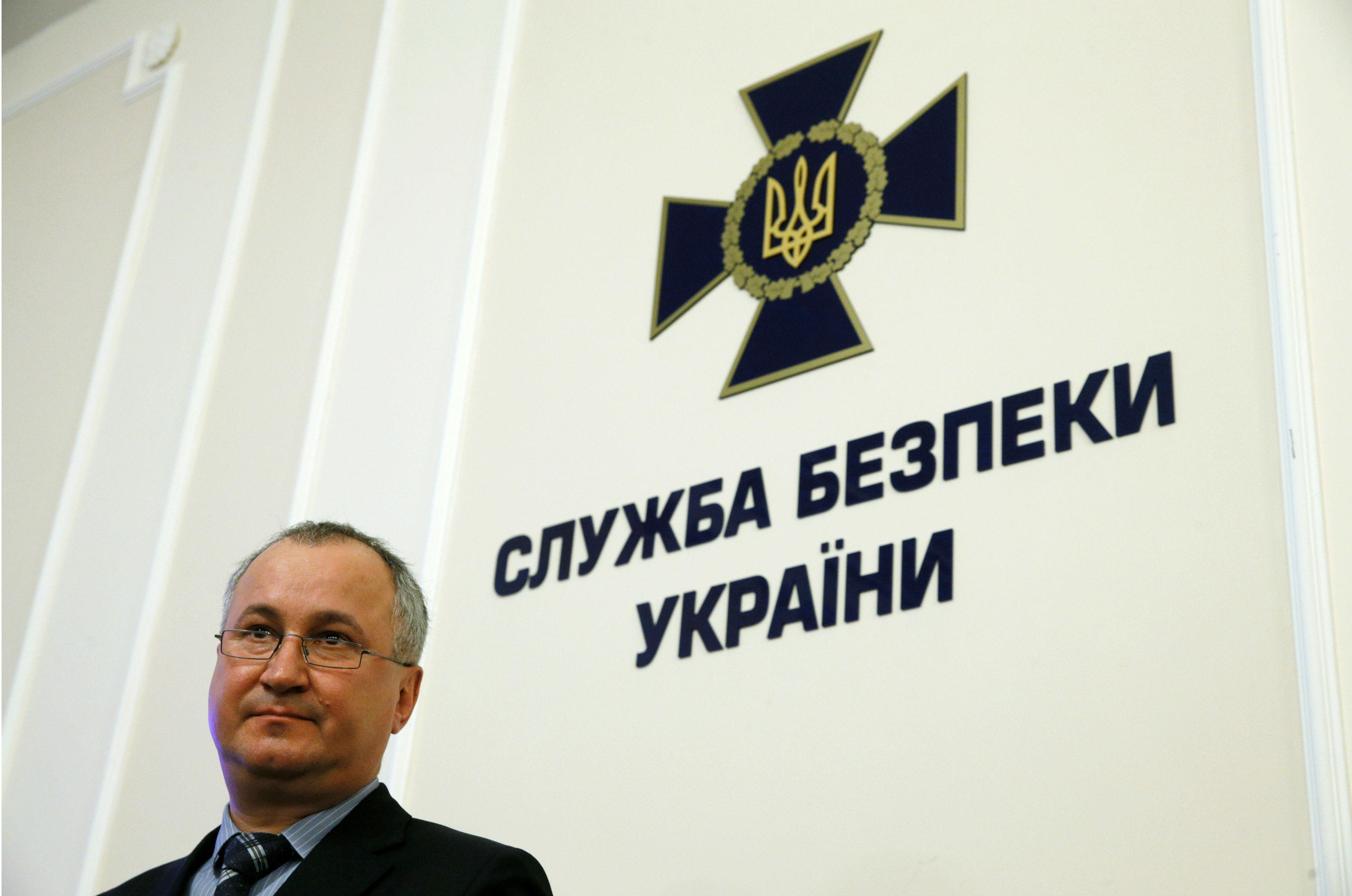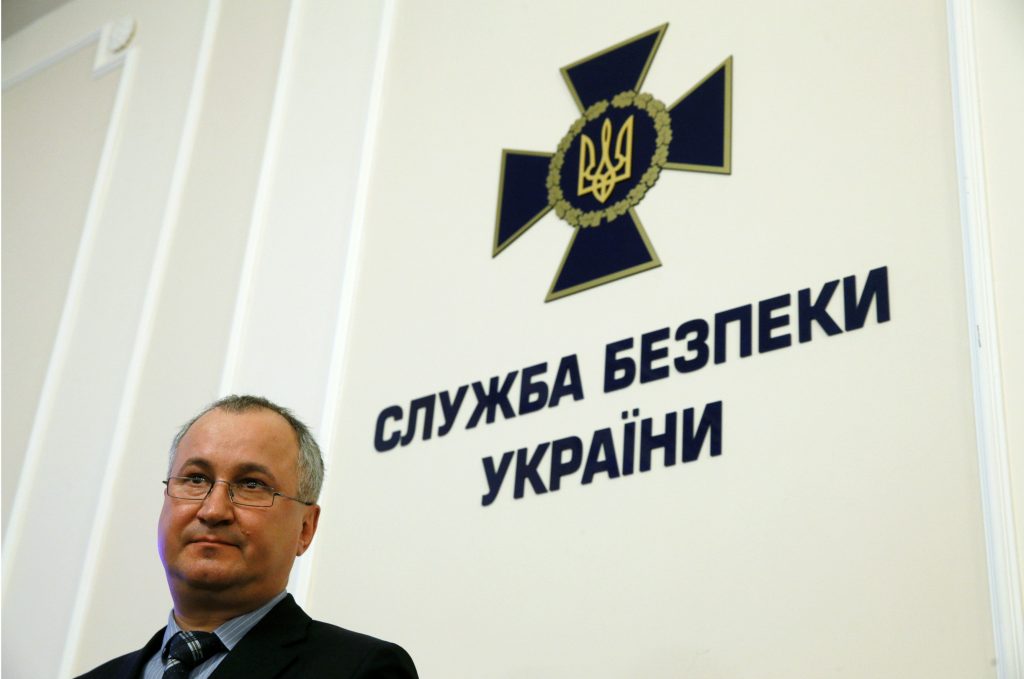 Ukraine’s Security Service (SBU) recently made headlines after masterminding a dramatic plot to spare the life of Russian journalist Arkady Babchenko. On May 29, newspapers announced that Babchenko had been assassinated in Kyiv, Ukraine, where he had been living as a dissident Russian journalist. The next day at what many thought was an ordinary SBU press conference, Babchenko surprised the crowd, announcing that he was not only alive but that he had cooperated with the SBU which had uncovered a plot against him. The reaction to Babchenko’s quick death and resurrection differed according to the audience; Ukrainians mostly celebrated the news, while the international community demanded evidence and an explanation for such extraordinary measures.
Ukraine’s Security Service (SBU) recently made headlines after masterminding a dramatic plot to spare the life of Russian journalist Arkady Babchenko. On May 29, newspapers announced that Babchenko had been assassinated in Kyiv, Ukraine, where he had been living as a dissident Russian journalist. The next day at what many thought was an ordinary SBU press conference, Babchenko surprised the crowd, announcing that he was not only alive but that he had cooperated with the SBU which had uncovered a plot against him. The reaction to Babchenko’s quick death and resurrection differed according to the audience; Ukrainians mostly celebrated the news, while the international community demanded evidence and an explanation for such extraordinary measures.
Ukrainians were thrilled that the SBU, which doesn’t have a good reputation, managed to carry out such a complicated operation. For once, they bested Russia.
While we wait for more information on the Babchenko case, now is time to examine the SBU, which remains the country’s only unreformed law enforcement institution. As Europe’s largest intelligence service with 31,000 employees, some do courageous work protecting Ukraine from internal and external threats, while others are distracted by functions that should not be under their purview, namely investigating corruption and organized crime, and this has to change.
Ukraine’s leadership has found no political will to reform a Soviet-style institution into one based on NATO standards. For nearly a year, the authorities have sat on reform plans that were developed with NATO.
However, there’s a solution. Parliament is considering presidential draft law #8068 “On National Security of Ukraine,” and it should take this opportunity to also reform the SBU by abolishing its anticorruption and economic intelligence functions. Hanna Hopko, a member of parliament and the head of the foreign relations committee, submitted amendments to the draft bill which would do exactly that. It would focus the SBU on combating terrorism and defending state sovereignty. Consideration of the bill may begin the week of June 18.
It’s difficult to grasp just how much power the SBU has. The best way to explain the SBU’s vast powers to Americans is to imagine an institution that combines the authorities and capacities of the CIA and the FBI with no civic or parliamentarian oversight. It’s easy to see why this is problematic.
The SBU has already been deprived of investigative powers related to corruption and organized and economic crimes. Nevertheless, its anticorruption and economic units are still gathering intelligence.
While these functions were previously justified by the need to assist the prosecutor’s office with investigative activities, this is no longer the case. In November 2017, the prosecution lost its investigative functions (apart from cases against former Yanukovych officials).
The power to investigate corruption and economic crimes was transferred to the National Anticorruption Bureau, the National Police, and the State Fiscal Service, which have investigation units of their own. The State Bureau of Investigations, which is expected to become operational by the end of 2018, will investigate public officials accused of economic and organized crime. Ukraine also awaits the creation of another special law enforcement body charged with investigating and preventing economic crimes called the Bureau of Financial Investigations.
The bottom line is that the SBU’s economic and anticorruption units duplicate the functions of other law enforcement bodies.
Nevertheless, the SBU and the PGO still initiate criminal investigations together against businesses and officials. The worst part is that these cases cannot be resolved in court. In other words, these investigations are utterly pointless. This was the case of former deputy Minister of Health Roman Vasylyshyn, who was caught by the SBU and the Prosecutor General’s Office red-handed taking a bribe. The court refused to consider the case because NABU did not carry out the investigation.
When leveling such strong charges against the SBU, it’s important to give specific examples of abuse. Below are just a few cases, reported by journalists.
In 2015, the SBU blocked nut companies from exporting their goods, claiming that the nuts were infected with worms, although the government sanitary agency did not detect any threats; at the same time, intermediary companies offered to overcome the ban for a share of the profit.
In 2016, the SBU tried to block the international procurement of medicines on the grounds that it was an ineffective way to spend public money. Buying drugs from international companies helped save the state up to 40 percent in 2017. Politically connected companies that used to embezzle money on drug procurement were threatened.
In 2016, the SBU paralyzed the LPG market in the interests of companies close to Putin’s crony Viktor Medvedchuk, as investigative journalists have reported. Meanwhile, the SBU searched top investment firm Dragon Capital and seized its computers for no credible reason.
In November 2017, the SBU tried to block a NABU undercover operation into migration service corruption. NABU persisted and few months later, in April 2018, it detained an SBU official who demanded and received almost $50,000 in bribes for helping people with forged residence papers in Ukraine avoid criminal responsibility.
This is a surprising allocation of time and staff for a country at war.
But that’s hardly the only problem.
Ukraine’s public officials are obliged to disclose their annual asset declarations online, but the SBU unlawfully hid asset declarations of each and every staff member. The agency claimed that all of its staff are not subject to the requirement, while the law exempts only undercover agents. Now SBU staff submit their declarations through a separate, parallel, and secret asset disclosure system to which none of the special anticorruption agencies has access.
Declarations of SBU staff are not available for verification and investigation of possible signs of fraud or illicit enrichment. This prevents any accountability over the lifestyles of SBU officials.
Still, investigative journalists do spot unusual activity now and then. For example, the head of the SBU’s anticorruption unit Pavlo Demchyna allegedly uses a luxurious house similar to ones worth approximately $385,000; according to his 2015 asset declaration, he didn’t own any property and lived in the SBU dormitory. The parents of Anna Hrytsak, the daughter-in-law of the head of the SBU Vasyl Hrytsak, bought four apartments less than half a year after his appointment.
The way forward is clear. National security reform should strengthen and focus the SBU on counterterrorism and counterintelligence activities only.
The United States, NATO, and the EU need to make their voices heard. After last week’s victory on the anti-corruption court, Ukraine’s elites may want to coast until parliamentary holidays in July. Plus there’s a limited window to press ahead on reforms before the country becomes completely overtaken with the 2019 elections. Now is the time to push.
Olena Halushka is the international relations manager at the Anti-Corruption Action Center, and Anastasia Krasnosilska is the advocacy officer at the Anti-Corruption Action Center in Kyiv, Ukraine.
Image: Ukraine's State Security Service (SBU) chief Vasyl Hrytsak speaks during a news conference in Kyiv, Ukraine, June 6, 2016. REUTERS/Valentyn Ogirenko

